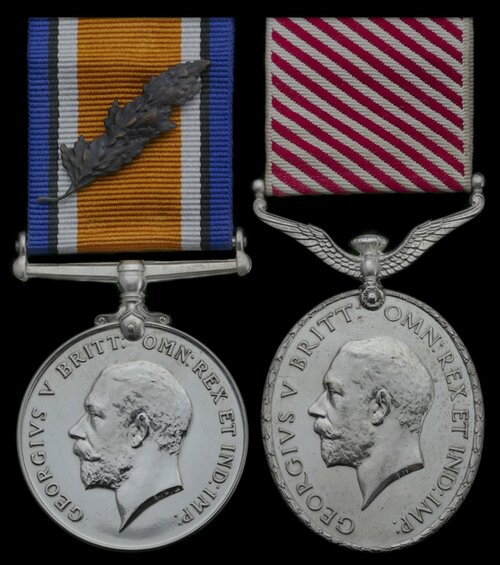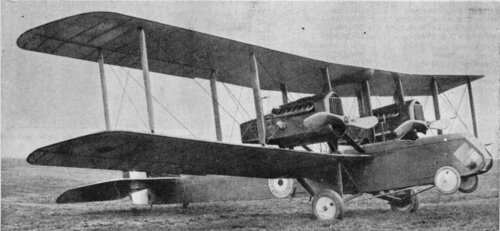Auction: 21003 - Orders, Decorations and Medals
Lot: 556
A rare 1920 Palestine A.F.M. pair awarded to Flight Sergeant W. J. Glyde, Royal Air Force, late Royal Naval Air Service, who served in the Mediterranean during the closing months of the Great War before undertaking the 1,720 mile Cairo to Baghdad air route
Air Force Medal, G.V.R. (314863 Flt. Sgt. W. J. Glyde. R.A.F.); British War Medal 1914-20, with M.I.D. oak leaves (314863. F. Sgt. W. J. Glyde. R.A.F.), contact marks, very fine (2)
A.F.M. London Gazette 12 July 1920.
M.I.D. London Gazette 1 January 1919.
One of nine Air Force Medas awarded to the Squadron for their service in Palestine.
William Joseph Glyde was born at Brighton, Sussex on 3 August 1892. He enlisted with the Royal Navy on 6 August 1910 as Carpenters Crew, serving mainly at shore establishments in that time though during the 1911 census he was aboard H.M.S. Triumph at Malta. Later Glyde served aboard the experimental seaplane Carrier H.M.S. Hermes from 18 May-23 December 1913. Promoted Air Mechanic on 1 July 1915 while serving in Britain. Appointed Petty Officer Class III on 1 June 1915 and Chief Petty Officer Class III on 1 September 1917. The next month Glyde transferred to the Mediterranean, serving here from 11 October 1917 until 31 March 1918 when he joined the fledgling Royal Air Force.
No. 216 Squadron was formed on 1 April 1918, taking part in over 162 bombing raids over Germany. After the Armistice they were employed in carrying mail to Cologne and Valenciennes before being transferred to Egypt in October 1919. While here they were based at Kantara, flying air mail in the region notably seeing service in Palestine, No. 216 Squadron also took part in the Baghdad air mail route from June 1921, carrying passengers and messages between Cairo and Baghdad using the Airco DH.10., an aircraft designed as a bomber. However this was soon replaced by the Vickers Vimy. The RAF took the leading role in the British occupation of Iraq and during the 1920s they faced increasing local resistance to the British presence in the region. As a result the link between Iraq and Egypt was increasingly important as a moral boost to British soldiers in those distant garrisons. The journey however was a gruelling 1,720 miles in tough conditions.
Glyde, by this time a Flight Sergeant, flew the route and doubtless had to contend with the problems all the airmen who flew it, such as the difficulties of navigating with basic instruments and few landmarks as well as conducting repairs on the fly. Their ingenuity and courage in undertaking the route was remarkable moreover with flight times sometimes lasting as long as 24 hours and their endurance must be marvelled at. It is noted in The Baghdad Air Mail by Wing Commander Roderick Hill that it was sometimes necessary to land the plane and sleep in or under it:
'If you landed for the night in the desert you could sleep in it, although I preferred to sleep outside under the wings.'
After discharge Glyde went on to make use of the skills he had learned in his youth, appearing on the 1939 census as a Carpenter Foreman living at the Military Camp, Broadbridge Heath, Horsham, Sussex. He was married at Hove, Sussex in 1951 but tragically died just three years later in 1954 at Brighton.
Subject to 20% VAT on Buyer’s Premium. For more information please view Terms and Conditions for Buyers.
Sold for
£1,700
Starting price
£800







